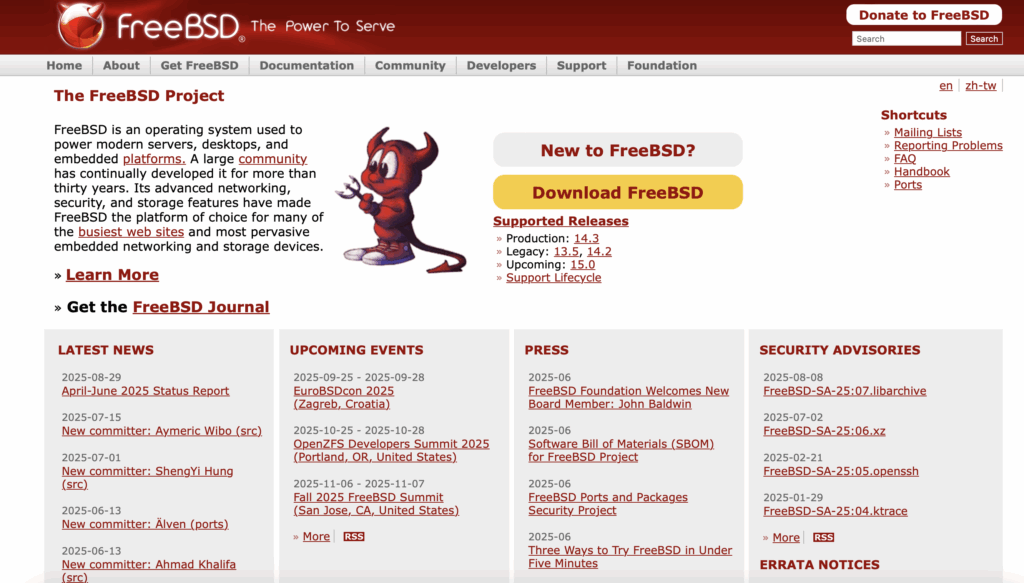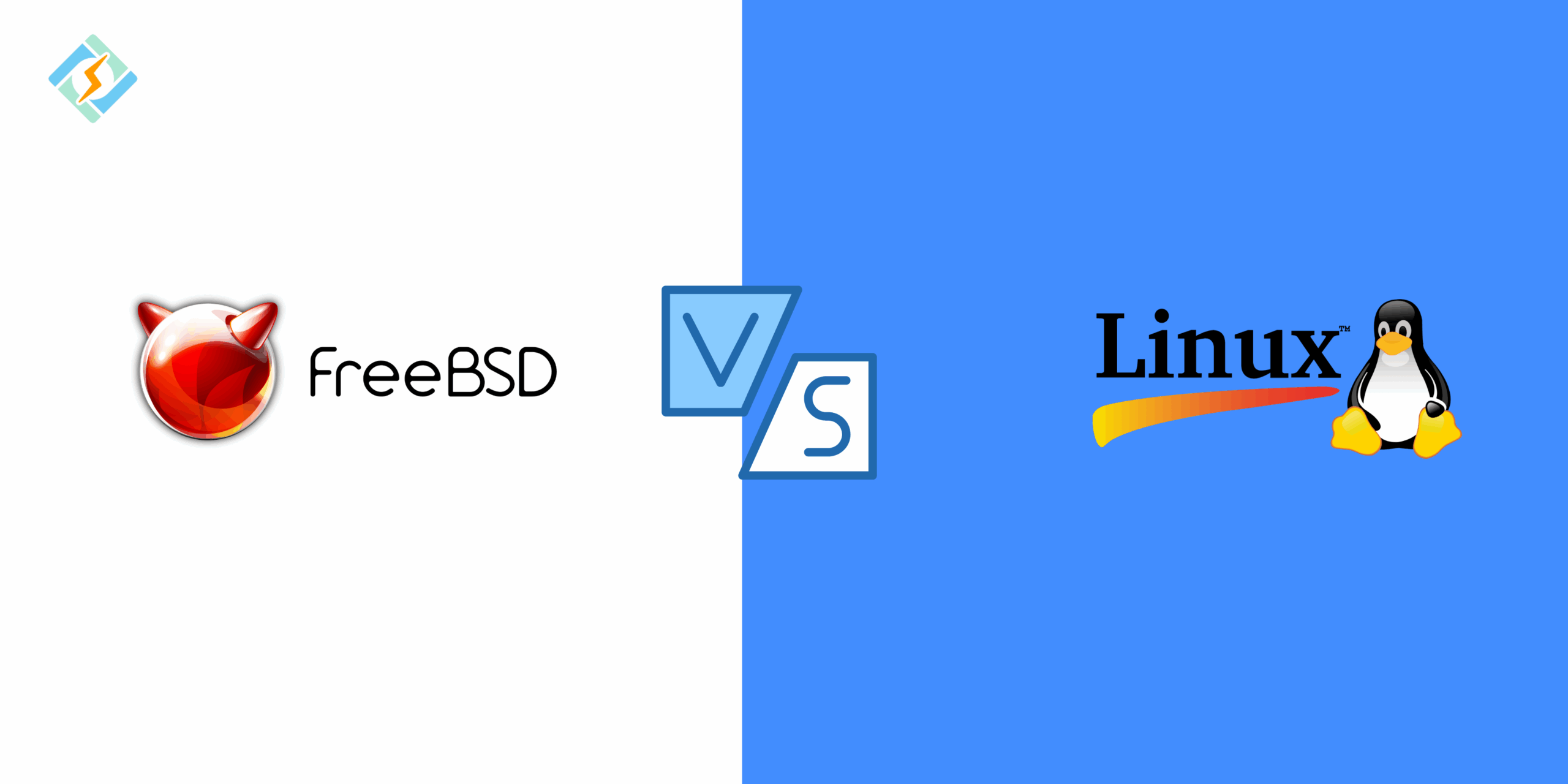When we talk about open source operating systems, Linux and FreeBSD stand out as two of the most reliable and versatile choices. Both are Unix-like systems that power almost everything from personal computers to enterprise servers, offering stability, security, and flexibility.
Even though the two are pretty similar on the front, they differ in multiple things like licensing models, system architecture, and package management.
In this guide, we shall compare FreeBSD vs Linux!
What is Linux?
Linux is one of the oldest open source Unix-like operating system kernels by Linus Torvalds in 1991. Over the last few years, it turned into a family of distros, called the Linux distributions, such as Ubuntu, Debian, Fedora, and CentOS. These distributions combine the Linux kernel with additional resources, like softwares, package managers, and desktop environments.
Linux is quite popular for flexibility, security, and scalability, making it the best fit for personal computers, enterprises, and cloud platforms. The open source nature allows constant innovation, frequent updates, and extensive hardware compatibility.
Use Cases of Linux
- Linux is widely used in hosting platforms, such as Ubuntu, CentOS, Debian, and others.
- Cloud computing is another use case for the Linux operating system.
- Ubuntu, Fedora, Linux Mint provide user-friendly desktop experiences.
- It is a popular operating system for programming and containerization.
- Lightweight distros like Alpine and Yocto are also an excellent example of Linux.
What is FreeBSD?

FreeBSD is another free and open-source Unix-like operating system that would trace its roots back to the Berkeley Software Distribution (BSD). However, unlike Linux, it is not just a kernel, it is a complete operating system that has both kernels and userland developed under a single project.
Get exclusive access to all things tech-savvy, and be the first to receive
the latest updates directly in your inbox.
FreeBSD is also known for being high performing, advanced, and more secure than Linux. It has high security, advanced networking features, and appliances. It uses the BSC license, which offers flexibility for developers and companies.
Use Cases of FreeBSD
- FreeBSD is the preferred option for the firewalls, routers, and NAS.
- It is used for servers.
- ZFS integration makes it excellent for enterprise storage.
- It is efficient for TCP/IP stack and suits high-load networking.
- The flexibility in licensing makes it attractive for projects that need customization.
FreeBSD vs Linux: Key Differences
| Feature | Linux | FreeBSD |
| Licensing | Uses the GNU General Public License (GPL) – requires sharing source code of modified versions. | Uses the BSD License – more permissive, allows code to be modified and redistributed without releasing source. |
| System Architecture | Linux is a kernel only; distributions combine it with other software (GNU tools, DEs, package managers). | FreeBSD is a complete OS, developed as a single project (kernel + userland tools). |
| Package Management | Different package managers depending on distro (e.g., APT for Ubuntu/Debian, YUM/DNF for RHEL/Fedora). | Uses the Ports Collection and pkg system for both binary and source-based installations. |
| Kernel and Updates | Kernel is updated frequently across distros; users decide when/how to update. | Kernel and base system updated together, providing consistency and stability. |
| Security Features | Strong security, with tools like SELinux, AppArmor, and frequent patches. | Emphasizes security by design, with features like jails (lightweight virtualization) and fine-grained access controls. |
| Community and Support | Large, global community with extensive commercial support (e.g., Red Hat, Canonical, SUSE). | Smaller community, but strong developer focus and enterprise support through companies like iXsystems. |
Performance Comparison: FreeBSD vs Linux
One of the most important factors that make up an operating system is the performance.
Speed and Efficiency
- Linux is optimised for multitasking and supports a wide range of workloads, which is excellent for high-performance computing, gaming, and general-purpose servers.
- FreeBSD is an efficient networking operating system and offers a streamlined design to make it the best choice for high-load server environments.
Stability and Reliability
- Linux offers extreme stability for long term projects but the stability can vary depending on the distribution.
- FreeBSD is also highly consistent and stable, and with a reputation for long uptimes and minimal crashes.
Hardware Compatibility
- Linux offers versatile hardware support with regularly updated drivers and compatibility with new devices.
- FreeBSD has limited hardware support but it is quite strong for server-grade components and networking devices.
Pros and Cons: Linux vs FreeBSD
| Aspect | Linux | FreeBSD |
| Pros | – Large community & support- Huge hardware compatibility- Variety of distributions- Excellent for cloud & containers | – Extremely stable & reliable- Integrated OS (kernel + userland)- Powerful networking & ZFS support- Permissive BSD license |
| Cons | – Fragmentation across distros- Some versions may trade stability for new features- Licensing may restrict customization | – Smaller community & support- Limited hardware compatibility- Fewer desktop-focused applications |
FreeBSD Vs Linux – Which One Should You Choose?
While choosing the perfect solution for your team, you should focus on the parameters that matter the most to your projects. Measure pros vs cons to find the best balance. To summarise:
- Go with Linux when you want intense flexibility, broad customer support, modern hardware, and cloud/ container deployments like Kubernetes.
- Choose FreeBSD when you need extreme stability, high-performance networking, advanced storage, or a permissive license for commercial projects.
Conclusion – Linux Vs FreeBSD
Linux and FreeBSD are both excellent choices for different domains. While Linux dominates the general purpose computing cloud, and desktop usage, FreeBSD shines in networking, storage, and special server environments.
FAQs
Which is better for servers: FreeBSD vs Linux?
FreeBSD is popular for stability and advanced networking (e.g., firewalls, routing), while Linux dominates in cloud, enterprise, and containerized environments due to wider support and tools.
Which is easier to use: Linux vs FreeBSD?
Linux distributions (like Ubuntu, Fedora) are more beginner-friendly, while FreeBSD is favored by advanced users who need fine-grained control.
Can I run Docker on FreeBSD?
Docker is not natively supported on FreeBSD. Instead, FreeBSD uses alternatives like Jails and bhyve for containerization and virtualization.



